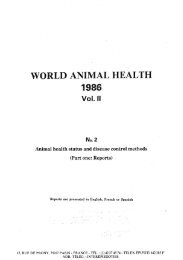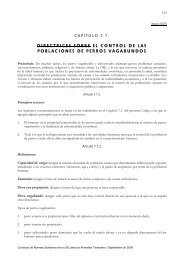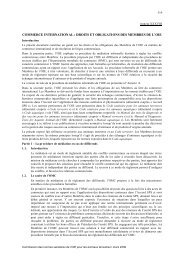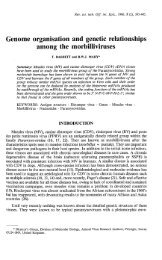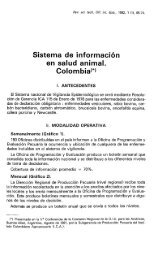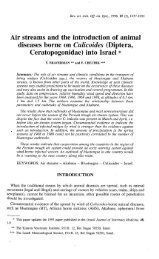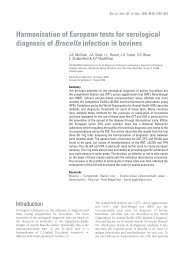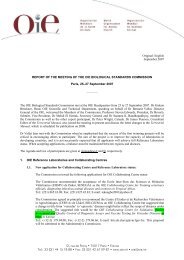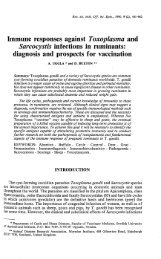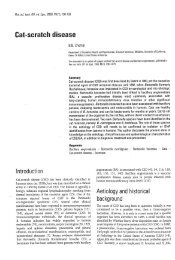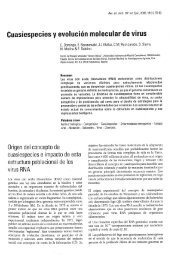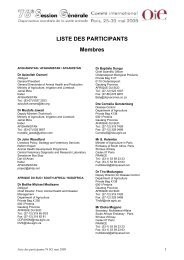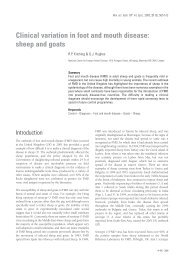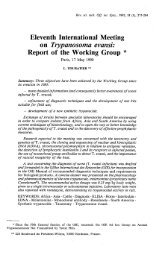26th Conference of the OIE Regional Commission for Asia
26th Conference of the OIE Regional Commission for Asia
26th Conference of the OIE Regional Commission for Asia
Create successful ePaper yourself
Turn your PDF publications into a flip-book with our unique Google optimized e-Paper software.
Discussions<br />
161. A representative <strong>of</strong> Hong Kong SAR, PRC, advised that even though Hong Kong had<br />
submitted its Aquatic and Terrestrial Animal Health Reports, this in<strong>for</strong>mation did not appear<br />
in <strong>the</strong> presentation. He fur<strong>the</strong>r advised that he could resend this in<strong>for</strong>mation as well as <strong>the</strong><br />
responses to <strong>the</strong> questionnaire relating to <strong>the</strong> sanitary situation which had been sent to all<br />
Members. Dr Vallat clarified that <strong>the</strong> questionnaire regarding <strong>the</strong> sanitary situation <strong>for</strong> <strong>the</strong><br />
<strong>Regional</strong> <strong>Conference</strong> had been submitted by Delegates and P.R. China had submitted its<br />
report. The matter will be discussed later with <strong>OIE</strong> Headquarters and <strong>the</strong> Delegate <strong>of</strong> China.<br />
162. The Delegate <strong>of</strong> Nepal commented that several <strong>OIE</strong> Members had submitted in<strong>for</strong>mation on<br />
simulation exercises <strong>the</strong>y had conducted and asked whe<strong>the</strong>r <strong>the</strong> details <strong>of</strong> those exercises could<br />
be made accessible to Members. He also asked if <strong>the</strong>re was an <strong>OIE</strong> standard <strong>for</strong>mat <strong>for</strong><br />
preparation <strong>of</strong> contingency plans. Dr Berlingieri advised <strong>the</strong> <strong>OIE</strong> process <strong>for</strong> distributing<br />
in<strong>for</strong>mation on simulation exercises, and commented that some Members published <strong>the</strong>ir<br />
contingency plans on <strong>the</strong> <strong>OIE</strong> website. These plans could be used as a model however <strong>the</strong>re<br />
was not yet <strong>OIE</strong> standard <strong>for</strong>mat <strong>for</strong> this.<br />
163. A representative <strong>of</strong> P.R. China suggested adding “vaccination coverage” to <strong>the</strong> Code glossary in<br />
order to avoid having vaccination coverage higher than 100%. Dr. Berlingieri advised that<br />
percentages above 100 in <strong>the</strong> presentation resulted from individual animals being vaccinated<br />
more than once in a given year as <strong>the</strong> system takes into account <strong>the</strong> number <strong>of</strong> doses applied<br />
and susceptible population.<br />
164. The Delegate <strong>of</strong> Pakistan advised that even though his country had sent its first six-monthly<br />
report, it appeared that <strong>OIE</strong> In<strong>for</strong>mation Department had not received it. Dr Berlingieri<br />
commented that <strong>the</strong> <strong>OIE</strong> in<strong>for</strong>mation systems had been upgraded to allow <strong>the</strong> differentiation<br />
between in<strong>for</strong>mation on domesticated animals and wildlife. This upgrade required Members<br />
that had already entered <strong>the</strong>ir first six-monthly report data <strong>for</strong> 2009 into WAHIS to verify<br />
<strong>the</strong>ir entries and to add <strong>the</strong> relevant data <strong>for</strong> wildlife. Dr Berlingieri advised that <strong>the</strong> <strong>OIE</strong> had<br />
sent a message to Members at <strong>the</strong> beginning <strong>of</strong> <strong>the</strong> year asking <strong>the</strong>m to delay sending <strong>the</strong>ir<br />
six-monthly report until <strong>the</strong> system had been upgraded; once <strong>the</strong> upgrade per<strong>for</strong>med, <strong>OIE</strong><br />
Members were requested to submit <strong>the</strong> first six-monthly report. He fur<strong>the</strong>r advised that when<br />
users had difficulties using <strong>the</strong> web connection, paper report <strong>for</strong>ms are acceptable and <strong>the</strong> <strong>OIE</strong><br />
In<strong>for</strong>mation Department will enter <strong>the</strong> in<strong>for</strong>mation into WAHIS.<br />
165. The representative <strong>of</strong> Hong Kong asked why <strong>the</strong> United States <strong>of</strong> America was included in <strong>the</strong><br />
report as a Member <strong>of</strong> <strong>the</strong> Region as this inclusion inflates <strong>the</strong> figures within <strong>the</strong> report. Dr<br />
Vallat explained that <strong>the</strong> criteria <strong>for</strong> defining <strong>Regional</strong> <strong>Commission</strong> Members included<br />
geographical considerations, and that <strong>the</strong> United States <strong>of</strong> America had territories (islands) in<br />
<strong>the</strong> Pacific.<br />
166. The Delegate <strong>of</strong> New Zealand raised two issues. He recalled that at <strong>the</strong> last <strong>Conference</strong> <strong>of</strong> <strong>the</strong><br />
<strong>Regional</strong> <strong>Commission</strong> in New Zealand two years ago concerns were raised about porcine<br />
reproductive and respiratory syndrome (PRRS) in <strong>the</strong> Region. He noted that this disease was<br />
not included within <strong>the</strong> report at this <strong>Conference</strong> and sought clarification on <strong>the</strong> current<br />
situation <strong>of</strong> PRRS. He <strong>the</strong>n expressed his concerns regarding <strong>the</strong> constant progress <strong>of</strong> PPR in<br />
<strong>Asia</strong> and Africa and asked what <strong>the</strong> <strong>OIE</strong> plans were in this matter. He also asked whe<strong>the</strong>r <strong>the</strong><br />
<strong>OIE</strong> could provide some guidance on <strong>the</strong> spread <strong>of</strong> PPR and on its control. Dr Berlingieri<br />
explained that PRRS had been addressed in detail during <strong>the</strong> 2009 <strong>OIE</strong> General Session and<br />
that <strong>the</strong>re had been no particular events occurred nor was <strong>the</strong>re substantial additional<br />
in<strong>for</strong>mation received since May 2009. He indicated that <strong>the</strong> <strong>OIE</strong> acknowledged <strong>the</strong> importance<br />
<strong>of</strong> PPR and was monitoring its expansion both in Africa, <strong>the</strong> Middle East and <strong>Asia</strong>. He noted<br />
that substantial work was also being carried out on tracking non-<strong>of</strong>ficial in<strong>for</strong>mation regarding<br />
this disease. Dr Vallat pointed out that, following <strong>the</strong> detailed discussions <strong>of</strong> <strong>the</strong> <strong>OIE</strong> General<br />
Session on PRRS, some specific recommendations on this disease were published on <strong>the</strong> <strong>OIE</strong><br />
25



